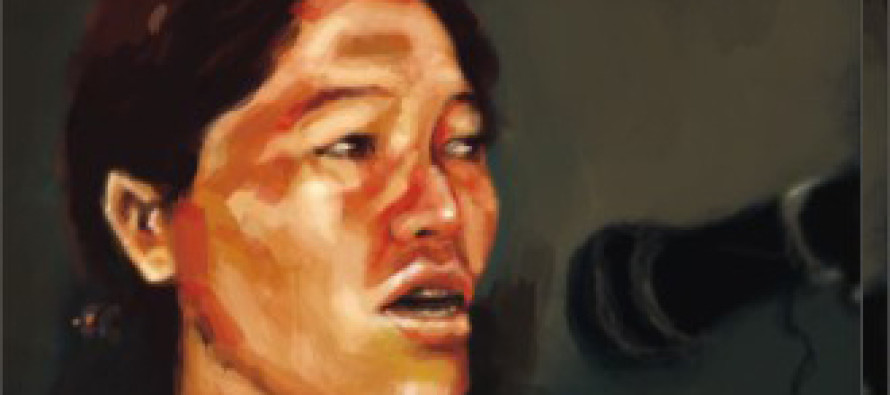We will not let them forget you

SHE was only 22 years old, a very vocal woman activist. An activist from a community that is treated by the Bangladesh state as second-class citizens. Someone who did not fear the most venerated institution in our country. A combination of all these elements made her a chillingly vulnerable person, a target for “The Vanishing” (i.e. those who are made to disappear without a trace).
The headlines in Daily Star and many other newspapers followed — “DU students urge government to rescue Kalpana Chakma” (The Daily Star, July 1, 1996), “Mahila Parishad urges govt to rescue Kalpana” (The Daily Star, July 2, 1996), “Abduction of Kalpana, Home ministry probe demanded” (The Daily Star, July 5, 1996), “Int’l appeal for Kalpana’s release” (The Daily Star, July 10, 1996), “HR bodies urge Home Ministry to rescue Kalpana” (The Daily Star, July 15, 1996), “Kalpana issue: 24 Infantry Div terms it a conspiracy against Army” (The Daily Star, July 24, 1996), “Where’s Kalpana?” (The Daily Star, July 24, 1996). 13 years after her abduction, there is still no answer to the question “Where is Kalpana?”
In a report by Bangladesh Human Rights Commission (BHRC), executive director Advocate KM Huq Kaiser claimed, without giving any evidence, that Kalpana was actually living in Tripura, India (The Daily Star, July 9, 1996). The report also claimed that the army officer accused of leading the abduction was “busy doing other duties” at the time of the incident.
Those who compiled this questionable BHRC report never talked to the two main witnesses to the abduction, Kalpana’s two brothers. Very soon, claims of sighting of yet another Kalpana Chakma turned up, in the form of Tripti Begum (The Daily Star, July 28, 1996) in Jhenidah. But this claim was also debunked.
While these false “sightings” were going on, and under increasing national and international pressure from human rights groups, the government was finally forced to form an enquiry committee in September 1996 to investigate the whereabouts of Kalpana. Interestingly, the report of the enquiry committee was never made public, and remains as elusive as it was when it was handed over to the then government. The person(s) responsible for the alleged abduction continue to enjoy complete impunity under every political party that has come to power.
Although the Awami League was in power in 1996, and they seemed to have a very pro-CHT attitude, nothing positive ever came out of the investigations taken under their authority. According to the accounts given by her mother and brother, Kalpana was taken away in the very early hours of the morning of June 12, 1996. This was the day of the national elections, which was won for the first time by the Hasina-led Awami League government. With their 2008 re-election under a promise for a transparent judicial system, we can perhaps re-ignite a hope for justice.
The post-1996 government showed political acumen by signing the 1997 CHT Peace Accord the following year, and managing to end the guerrilla war in the region. Unfortunately, although Pahari guerrilla leader Shantu Larma did lay down arms and sign the treaty, most of the clauses in the treaty remain unfulfilled until today.
In its 2008 election manifesto, the AL has promised to fully implement the CHT Peace Accord, and Deputy Leader of the Parliament Syeda Sajeda Chowdhury was made chairperson of the national committee for implementation of the Accord.
Kalpana never witnessed the signing of the Peace Accord. Her life was cut short much too early. But while she lived, as Organising Secretary of the Hill Women’s Federation (HWF), she actively fought for the rights of Pahari people. Sexual crimes against Bangladeshi women are high, but Pahari women have always been more vulnerable. The HWF was primarily formed to resist rape and sexual crimes against Pahari women.
Kalpana’s diary, along with newspaper clippings and activists’ articles, was published as a book ‘Kalpana Chakma’s Diary’. Her very articulate memoirs reveal the struggle of the Pahari people under government and military occupation. In her writings she reveals her tough opposition to the patriarchal society and her abhorrence of living under military and racial domination. She talks about equal participation of Bengali and Chakma men and women in the democratic political process. She describes how society has created a structure where a woman taking a stance is always seen as a disturbance.
Each year, on June 12, there are rallies, discussions and human chains to demand justice for Kalpana Chakma, and to call for implementation of the Peace Accord. This year will be similar, but will the protests by heard by the government, at last? Kalpana, at a very young age, had shown great political acumen and leadership qualities. She had the potential to pierce the veil separating the people from their rulers. Therefore, she had to be disappeared before she could make any “trouble.” Her abductors were successful and were never punished. How much longer will we continue to let the perpetrators get away with this crime? It is still in our hands.
Hana Shams Ahmed is Assistant Editor, Forum. Email:hana.s.ahmed@gmail.com. | original source


